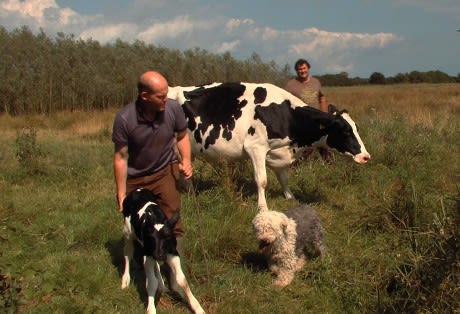As is the standard for increased globalization worldwide, U.K farmers are finding it increasingly difficult to maintain a traditional self-operating farm, requiring government dividends just to break even while technically operating at a loss. The dairy, livestock and crop industries have been gravitating towards an industrialized, factory-based ethos, where much of the work is automated and structured in a corporate timecard capacity.
With The Moo Man, director Andy Heathcote mirrors this over-riding plight—and redundant ode to the death of an antiquated way of life—with the selling of unpasteurized milk to townsfolk. Organic farmer Steve Hook believes that "fresh" milk is ideal for mass consumption, ignoring the many health risks associated with providing a product to people that may be full of disease-causing pathogens.
Ignoring this bit of idealism and scrolling past the extended sequence when Hook's cows are tested for tuberculosis—something that might put a damper on selling their milk to the public—the appeal of this heart-warming and occasionally comic documentary is the cutesy naivety of it all.
Hook has a genuinely likable disposition, which is made almost saintly by his genuine love of, and appreciation for, his cows. Working tirelessly, he gives his livestock individual care, naming them and reflecting with emotion when they are injured, or are separated from their calves, similarly expression dissatisfaction when they birth bulls that he can't milk.
Just as Hook copes with the inevitable mortal lifespan of his favourite cow, the overall message of a dying way of life chimes in to wax nostalgic about the horrors of modern life, reiterating the base human fear of change.
While city folk may find the overly saccharine way that farm life is depicted as charming and delightful, laughing whenever a cow is obstinate and crying whenever they fall ill or struggle in (graphic) births, those familiar with farming will be prone to groans and eye-rolls. There's something vaguely insulting about the overly prosaic way that farming is handled here, especially when the preachy theme is factored in, reducing Hook's daily experience to a fear tactic or political platform for a broad issue.
There's also a strange simplicity to the ideals presented that insults audience intelligence, just as there's an overly trite way that narrative tropes are positioned to register an emotional response to injured livestock. The intention is to attribute mortal fears to the inevitability of change, which is something far too manipulative and crass to ignore.
Though highly accessible to a broad urban audience, The Moo Man is a highly immature work that posits an impractical—albeit seemingly nice—worldview that's almost as dangerous as handing out unpasteurized "raw "milk to undiscerning consumers.
(Trufflepig Films)With The Moo Man, director Andy Heathcote mirrors this over-riding plight—and redundant ode to the death of an antiquated way of life—with the selling of unpasteurized milk to townsfolk. Organic farmer Steve Hook believes that "fresh" milk is ideal for mass consumption, ignoring the many health risks associated with providing a product to people that may be full of disease-causing pathogens.
Ignoring this bit of idealism and scrolling past the extended sequence when Hook's cows are tested for tuberculosis—something that might put a damper on selling their milk to the public—the appeal of this heart-warming and occasionally comic documentary is the cutesy naivety of it all.
Hook has a genuinely likable disposition, which is made almost saintly by his genuine love of, and appreciation for, his cows. Working tirelessly, he gives his livestock individual care, naming them and reflecting with emotion when they are injured, or are separated from their calves, similarly expression dissatisfaction when they birth bulls that he can't milk.
Just as Hook copes with the inevitable mortal lifespan of his favourite cow, the overall message of a dying way of life chimes in to wax nostalgic about the horrors of modern life, reiterating the base human fear of change.
While city folk may find the overly saccharine way that farm life is depicted as charming and delightful, laughing whenever a cow is obstinate and crying whenever they fall ill or struggle in (graphic) births, those familiar with farming will be prone to groans and eye-rolls. There's something vaguely insulting about the overly prosaic way that farming is handled here, especially when the preachy theme is factored in, reducing Hook's daily experience to a fear tactic or political platform for a broad issue.
There's also a strange simplicity to the ideals presented that insults audience intelligence, just as there's an overly trite way that narrative tropes are positioned to register an emotional response to injured livestock. The intention is to attribute mortal fears to the inevitability of change, which is something far too manipulative and crass to ignore.
Though highly accessible to a broad urban audience, The Moo Man is a highly immature work that posits an impractical—albeit seemingly nice—worldview that's almost as dangerous as handing out unpasteurized "raw "milk to undiscerning consumers.
